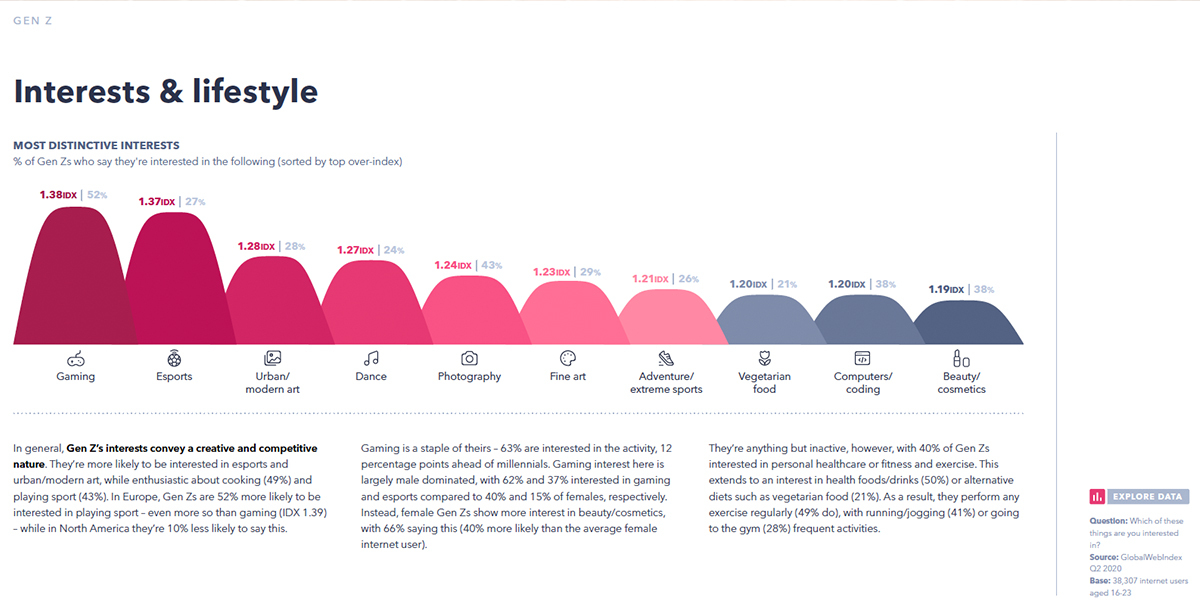As smartphone natives, members of Gen Z take the title of the most digitally engaged generation yet.
They grew up with social media platforms, streaming music and TV, and they engage in constant battles on gaming devices (at least, that’s how older generations see it). Data shows that the latest generation might be more attuned to a healthier use of such platforms and devices than we imagined.
With some of the older members of Gen Z starting careers and families — and forming their own opinions about the world around them — the generation’s coming of age is a hot topic.
Gen Z’s attitudes and activities online reflect an approach to an uncertain future. This youthful subgroup isn’t home to the flashy, tech-savvy pioneers of prior generations. Its members are vocal, informed and hell-bent on changing a world that has quickly changed them.
Gen Zer Lizzie Gustafson is a Media Coordinator at The Brandon Agency. She shares that pioneering vision and points out that her generation has the experience of history-altering events on its timeline already.
“I believe we have the potential to continue to grow and build a world where everyone is happy,” Gustafson said. “The plans I have are small but meaningful — I want to be successful on my own, and inspire others to be fearless and follow their goals.”
Thanks to our relationship with GlobalWebIndex, an innovative and leading market research SaaS company, we at The Brandon Agency have been able to gather some insightful data on Generation Z, whose birth years fall around the late 1990s to mid 2010s. Here, we explore Gen Z’s coming of age, where and how they live, and how to reach them.
As many members of Gen Z looked to venture into adulthood amid a robust economy and record-low unemployment, COVID-19 hit.
Suddenly, as with Millennials before them (whose coming of age occurred during the Great Recession), the world opening for Gen Z became murkier. How each navigates the obstacles set before them is one of the subtle differences between the generations.
How is Gen Z coming of age?
This is a time of transition for the latest generation. While older members become parents and join the workforce, its younger members are still forming attitudes and outlooks based on their experiences. The generation, then, straddles the line between childhood and adulthood. Here’s an examination into how that looks for them.
Gen Z makes up a quarter of all internet users — and most are still in these categories:
- Full-time student
- Living with parents
- Occupying the lower-income segment
Gen Z Demographic Info
Ages
What ages exactly are Generation Z? It depends on who you ask.
The newest named generation has birthdays from 1997 to 2012-15, generally. That puts its members at ages 8 to 23 — a wide swath, for sure. We’re talking elementary school to just out of college and into their first jobs.
According to Kasasa, a financial technology and marketing services company, Gen Z is 68 million strong in the U.S.
Some on the cusp of the Millennial and Gen Z generations tend to side with the newer generation. Kirby Altman is Marketing and Production Manager at The Brandon Agency. Gen Z just fits her, she said.
“Millennials tend to be idealistic,” Altman said. “Gen Zers are more practical — I identify with this, being very realistic and practical in my opinions. Millennials tend to value teamwork, while Gen Z is more independent and competitive — I think I identify with this, too. I do value teamwork at times, but I find that I like to be independent and have a competitive mindset.”
Income
GWI polling shows that 41% of Gen Z earns in the lower-income segments. The others’ income categories:
- 24%: Medium
- 18%: High
- 17%: Don’t know or prefer not to say
Interests

Gen Zers are competitive and creative. Euro Gen Z is more likely to play a sport than partake in video gaming like their American counterparts. Globally, they’re also ardent cooks — a trend that’s perhaps at least partially a product of COVID-19 lockdowns early in many of their adult lives.
Gen Zer Lizzy Smith is Junior Art Director at The Brandon Agency. She said she wouldn’t consider herself a chef, but knows enough to get by.
“My husband is definitely the cook of the two of us, so he usually does the cooking,” Smith said. “I did notice cooking a little bit more than normal when the pandemic first hit. Especially for dinners when we couldn’t go out to a restaurant, we had to get creative and cook it ourselves.”
Gaming is big for Gen Zers (63% are interested, 12 percentage points ahead of Millennials). It’s mostly the guys — 62% to 40%. Female Gen Zers lean toward beauty and cosmetics (66%, 40% more likely than the average female internet user).
For them, it’s not all days spent in gaming chairs — 40% of Gen Zers show interest in personal healthcare or fitness and exercise. Half are into healthy foods and drinks, and 21% practice alternative diets, such as vegetarianism. Half exercise regularly, especially running or jogging (41%) and gym workouts (28%).
Gen Zer Brianna Young is a Social Media Associate at The Brandon Agency. She lists cooking, fitness, and beauty and cosmetics among her interests.
“I try to work out two to three times a week,” Young said. “I usually shop once a week for groceries, and I don’t shop for cosmetics often. But when I do, it’s usually at a drug store.”
Living arrangements
Although the older set within Gen Z is largely out on their own, a good percentage of the generation’s members are still under mom and dad’s roof. GWI data suggests 72% live with at least one parent. Another 32% share a residence with another family member.
Other arrangements:
- 8%: Live with partner
- 6%: Live alone
- 5%: Live with roommate or friend
- 5%: Live with child or children
- 2%: Other arrangements
As an intern, Young rented a room in a house short-term. She now lives in her own apartment and has no plans to go anywhere else anytime soon, she said.
“Location and certain things included in the apartment like a washer and dryer, dishwasher, etc. were factors in choosing where I’m living,” Young said. “And the price.”
Where do they live?
- 58%: Urban
- 24%: Suburban
- 18%: Rural
Altman said she grew up in a rural area, but since getting married, moved to the suburbs.
“There are definitely pros to living in a suburban vs. rural area, because we are closer to restaurants and grocery stores than when I lived outside of town,” she said. “But my husband and I are shopping for homes and land in a rural area because of privacy and our outdoor hobbies.”
How can The Brandon Agency help with your strategy?
Connecting with any demographic hinges on understanding its members. Part of that is attained through analysis and metrics. Creativity also plays a role. But none of it will matter if a brand isn’t joining the conversation where it is, and how it’s being conducted.
Means of reaching this generation differ from those for reaching others. Facebook and Twitter, for example, aren’t as effective for Gen Z as it might be for Gen X or Baby Boomers.
“I think crafting a cohesive social media and paid media strategy for Instagram and TikTok would be the best way to take advantage and target the Gen Z audience,” Young said.
“We are turning in that direction by understanding that audience more and what they react to and would like to see, and adjusting our marketing,” said Richelle Greenberg, a Project Manager at The Brandon Agency.
Reach out today to see what strategies you can put in place with The Brandon Agency to best reach your potential Gen Z audience.
